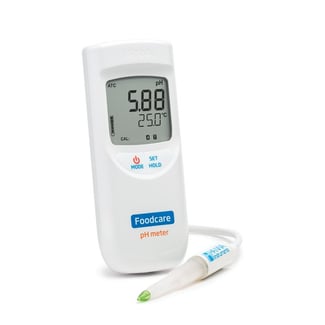
Ripened tomatoes can be used to make a variety of dishes and processed foods, such as pizza sauce, salsa, and ketchup. To ensure the quality of these processed foods is high, the quality of the raw materials is extremely important. This means that tomatoes should be at the desired maturity before they can be used to make processed goods.
While color is one way to determine ripeness, it can be inaccurate due to how subjective color can be. The color of tomatoes also tends to vary from the breed of tomato. A less subjective and more accurate method to determine tomato maturity is to measure its pH. For a perfectly ripe tomato, optimal pH is around 4.6. However, in processed food, the pH needs to be below pH 4.6 in order to avoid the growth of pathogens and microbes. Ideally, food processors aim for around pH 4.2 for food safety.
Tomatoes become less acidic as they mature so tomatoes are often not harvested for use in processed food until they are slightly overripe. If the tomatoes have a pH greater than 4.2 at the time of harvest, then citric acid is usually added to lower the pH. The additional chemical cost of this acidification process can be reduced if tomatoes are picked at the optimal time.
 A tomato grower and sauce processor approached Hanna and expressed interest in obtaining a pH meter for testing the maturity of tomatoes in his greenhouses, as well as in his final sauces. He wanted to maximize the efficiency of his process by waiting until the tomatoes were at an ideal pH before picking them. He also wanted to measure the pH of his sauces before canning to ensure they were at the proper pH to inhibit spoilage by microbial growth to maximize shelf life.
A tomato grower and sauce processor approached Hanna and expressed interest in obtaining a pH meter for testing the maturity of tomatoes in his greenhouses, as well as in his final sauces. He wanted to maximize the efficiency of his process by waiting until the tomatoes were at an ideal pH before picking them. He also wanted to measure the pH of his sauces before canning to ensure they were at the proper pH to inhibit spoilage by microbial growth to maximize shelf life.
The customer was looking for something portable that he could carry with him and check the pH of the tomatoes on the plant, as well as something that was food safe and could be used to directly measure his final product. Hanna recommended the Portable Food and Dairy pH Meter - HI99161 with a Foodcare pH Electrode for Dairy Products and Semi-Solid Foods - FC202D.
The meter is small, allowing it to be easily carried, yet heavy-duty and waterproof, so damage is not something that is of great concern. The FC202D electrode is a specially made food electrode. It is made of food grade plastic that the meets FDA regulations for direct contact with food. The conical shape of the glass bulb allows it to penetrate the tomato, and the open junction provides a high area of contact with the tomato, avoiding the need to juice or homogenize the tomato for analysis. With this shape, just by cutting the tomato with a knife and inserting the pH electrode, a pH reading can be obtained.
This pH electrode comes with a built-in temperature sensor and is gel filled, both which are useful in the field. The tomato processor also appreciated that Hanna offered a variety of pH buffer solutions as well as electrode cleaning solutions. The sauce manufacturer appreciated that Hanna was able to provide him a total solution for his tomato processing needs.
That's why we've dedicated our blog as a helpful resource for you to use! Catch up on the latest products, explore industry trends, discover testing tips, learn how to improve results, and more. Got questions? Email sales@hannainst.com.

